- Home
- Alfred Bester
The Stars My Destination ( Tiger! Tiger! )
The Stars My Destination ( Tiger! Tiger! ) Read online
The Stars My Destination ( Tiger! Tiger! )
Alfred Bester
The Stars My Destination (originally called Tiger! Tiger!, from William Blake's poem "The Tyger") is a science fiction novel by Alfred Bester, first published in Galaxy magazine as a 4-part serial, beginning in the October 1956 issue.
The Stars My Destination is, in one sense, a science-fiction adaption of Alexandre Dumas' The Count of Monte Cristo. It is the study of a man completely lacking in imagination or ambition, Gulliver Foyle. Fate transforms "Gully" Foyle in an instant; shipwrecked in space, then abandoned by a passing luxury liner, Foyle becomes a monomaniacal and sophisticated monster bent upon revenge. Wearing many masks, learning many skills, this "worthless" man pursues his goals relentlessly; no price is too high to pay.
Alfred Bester
THE STARS MY DESTINATION
PART I
Tiger! Tiger! burning bright
In the forests of the night,
What immortal hand or eye
Could frame thy fearful symmetry?
–Blake
PROLOGUE
THIS WAS A GOLDEN AGE, a time of high adventure, rich living, and hard dying . . . but nobody thought so. This was a future of fortune and theft, pillage and rapine, culture and vice . . . but nobody admitted it. This was an age of extremes, a fascinating century of freaks . . . but nobody loved it.
All the habitable worlds of the solar system were occupied. Three planets and eight satellites and eleven million million people swarmed in one of the most exciting ages ever known, yet minds still yearned for other times, as always. The solar system seethed with activity . . . fighting, feeding, and breeding, learning the new technologies that spewed forth almost before the old had been mastered, girding itself for the first exploration of the far stars in deep space; but, «Where are the new frontiers?» the Romantics cried, unaware that the frontier of the mind had opened in a laboratory on Callisto at the turn of the twenty-fourth century. A researcher named Jaunte set fire to his bench and himself (accidentally) and let out a yell for help with particular reference to a fire extinguisher. Who so surprised as Jaunte and his colleagues when he found himself standing alongside said extinguisher, seventy feet removed from his lab bench.
They put Jaunte out and went into the whys and wherefores of his instantaneous seventy-foot journey. Teleportation . . . the transportation of oneself through space by an effort of the mind alone. . . had long been a theoretic concept, and there were a few hundred badly documented proofs that it had happened in the past. This was the first time that it had ever taken place before professional observers.
They investigated the Jaunte Effect savagely. This was something too earth-shaking to handle with kid gloves, and Jaunte was anxious to make his name immortal. He made his will and said farewell to his friends. Jaunte knew he was going to die because his fellow researchers were determined to kill him, if necessary. There was no doubt about that.
Twelve psychologists, parapsychologists and neurometrists of varying specialization were called in as observers. The experimenters sealed Jaunte into an unbreakable crystal tank. They opened a water valve, feeding water into the tank, and let Jaunte watch them smash the valve handle. It was impossible to open the tank; it was impossible to stop the flow of water.
The theory was that if it had required the threat of death to goad Jaunte into teleporting himself in the first place, they'd damned well threaten him with death again. The tank filled quickly. The observers collected data with the tense precision of an eclipse camera crew. Jaunte began to drown. Then he was outside the tank, dripping and coughing explosively. He'd teleported again.
The experts examined and questioned him. They studied graphs and X-rays, neural patterns and body chemistry. They began to get an inkling of how Jaunte had teleported. On the technical grapevine (this had to be kept secret) they sent out a call for suicide volunteers. They were still in the primitive stage of teleportation; death was the only spur they knew.
They briefed the volunteers thoroughly. Jaunte lectured on what he had done and how he thought he had done it. Then they proceeded to murder the volunteers. They drowned them, hanged them, burned them; they invented new forms of slow and controlled death. There was never any doubt in any of the subjects that death was the object.
Eighty per cent of the volunteers died, and the agonies and remorse of their murderers would make a fascinating and horrible study, but that has no place in this history except to highlight the monstrosity of the times. Eighty per cent of the volunteers died, but 20 per cent jaunted. (The name became a word almost immediately.)
«Bring back the romantic age,» the Romantics pleaded, «when men could risk their lives in high adventure.»
The body of knowledge grew rapidly. By the first decade of the twenty-fourth century the principles of jaunting were established and the first school was opened by Charles Fort Jaunte himself, then fifty-seven, immortalized, and ashamed to admit that he had never dared Jaunte again. But the primitive days were past; it was no longer necessary to threaten a man with death to make him teleport. They had learned how to teach man to recognize, discipline, and exploit yet another resource of his limitless mind.
How, exactly, did man teleport? One of the most unsatisfactory explanations was provided by Spencer Thompson, publicity representative of the Jaunte Schools, in a press interview.
THOMPSON:Jaunting is like seeing; it is a natural aptitude of almost every human organism, but it can only be developed by training and experience.
REPORTER:You mean we couldn't see without practice?
THOMPSON:Obviously you're either unmarried or have no children preferably both.
(Laughter)
REPORTER:I don't understand.
THOMPSON:Anyone who's observed an infant learning to use its eyes, would.
REPORTER:But what is teleportation?
THOMPSON:The transportation of oneself from one locality to another by an effort of the mind alone.
REPORTER:You mean we can think ourselves from . . say . . . New York to Chicago?
THOMPSON:Precisely; provided one thing is clearly understood. In jaunting from New York to Chicago it is necessary for the person teleporting himself to know exactly where he is when he starts and where he's going.
REPORTER:How's that?
THOMPSON:If you were in a dark room and unaware of where you were, it would be impossible to jaunte anywhere with safety. And if you knew where you were but intended to jaunte to a place you had never seen, you would never arrive alive. One cannot jaunte from an unknown departure point to an unknown destination. Both must be known, memorized and visualized.
REPORTER:But if we know where we are and where we're going. . .
THOMPSON:We can be pretty sure we'll jaunte and arrive.
REPORTER:Would we arrive naked?
THOMPSON:If you started naked. (Laughter)
REPORTER:I mean, would our clothes teleport with us?
THOMPSON:When people teleport, they also teleport the clothes they wear and whatever they are strong enough to carry. I hate to disappoint you, but even ladies' clothes would arrive with them.(Laughter)
REPORTER:But how do we do it?
THOMPSON:How do we think?
REPORTER:With our minds.
THOMPSON:And how does the mind think? What is the thinking process? Exactly how do we remember, imagine, deduce, create? Exactly how do the brain cells operate?
REPORTER:I don't know. Nobody knows.
THOMPSON:And nobody knows exactly how we teleport either, but we know we can do it-just as we know that we can think. Have you ever heard of Descartes? He said: Cogito ergo sum. I think, therefore
I am. We say: Cogito argo jaunteo. I think, therefore I jaunte.
If it is thought that Thompson's explanation is exasperating, inspect this report of Sir John Kelvin to the Royal Society on the mechanism of jaunting:
We have established that the teleportative ability is associated with the Nissl bodies, or Tigroid Substance in nerve cells. The Tigroid Substance is easiest demonstrated by Nissl's method using 3.7~ g. of methylen blue and i .'~ g. of Venetian soap dissolved in 1,000 CC. of water.
Where the Tigroid Substance does not appear, jaunting is impossible. Teleportation is a Tigroid Function.
(Applause)
Any man was capable of jaunting provided he developed two faculties, visualization and concentration. He had to visualize, completely and precisely, the spot to which he desired to teleport himself; and he had to concentrate the latent energy of his mind into a single thrust to get him there. Above all, he had to have faith . . . the faith that Charles Fort Jaunte never recovered. He had to believe he would jaunte. The slightest doubt would block the mind-thrust necessary for teleportation.
The limitations with which every man is born necessarily limited the ability to jaunte. Some could visualize magnificently and set the co-ordinates of their destination with precision, but lacked the power to get there. Others had the power but could not, so to speak, see where they were jaunting. And space set a final limitation, for no man had ever jaunted further than a thousand miles. He could work his way in jaunting jumps over land and water from Nome to Mexico, but no jump could exceed a thousand miles.
By the 2420's, this form of employment application blank had become a commonplace:
This space reserved for
retina pattern () identification
NAME (Capital Letters)~
LastMiddleFirst
RESIDENCE (Legal)~
Continent Country County
JAUNTE CLASS (Official Rating: Check one Only):
M (1.000 miles)~L (50 miles)
D (500 miles):X (10 mi1es)~
C (100 miles):.V(5 miles)~
The old Bureau of Motor Vehicles took over the new job and regularly tested and classed jaunte applicants, and the old American Automobile Association changed its initials to AJA.
Despite all efforts, no man had ever jaunted across the voids of space, although many experts and fools had tried. Helmut Grant, for one, who spent a month memorizing the co-ordinates of a jaunte stage on the moon and visualized every mile of the two hundred and forty thousand-mile trajectory from Times Square to Kepler City. Grant jaunted and disappeared. They never found him. They never found Enzio Dandridge, a Los Angeles revivalist looking for Heaven; Jacob Maria Freundlich, a paraphysicist who should have known better than to jaunte into deep space searching for metadimensions; Shipwreck Cogan, a professional seeker after notoriety; and hundreds of others, lunatic-fringers, neurotics, escapists and suicides. Space was closed to teleportation. Jaunting was restricted to the surfaces of the planets of the solar system.
But within three generations the entire solar system was on the jaunte. The transition was more spectacular than the change-over from horse and buggy to gasoline age four centuries before. On three planets and eight satellites, social, legal, and economic structures crashed while the new customs and laws demanded by universal jaunting mushroomed in their place.
There were land riots as the jaunting poor deserted slums to squat in plains and forests, raiding the livestock and wildlife. There was a revolution in home and office building: labyrinths and masking devices had to be introduced to prevent unlawful entry by jaunting. There were crashes and panics and strikes and famines as pre-jaunte industries failed.
Plagues and pandemics raged as jaunting vagrants carried disease and vermin into defenseless countries. Malaria, elephantiasis, and the breakbone fever came north to Greenland; rabies returned to England after an absence of three hundred years. The Japanese beetle, the citrous scale, the chestnut blight, and the elm borer spread to every corner of the world, and from one forgotten pesthole in Borneo, leprosy, long imagined extinct, reappeared.
Crime waves swept the planets and satellites as their underworlds took to jaunting with the night around the clock, and there were brutalities as the police fought them without quarter. There came a hideous return to the worst prudery of Victorianism as society fought the sexual and moral dangers of jaunting with protocol and taboo. A cruel and vicious war broke out between the Inner Planets-Venus, Terra and Mars-and the Outer Satellites . . . a war brought on by the economic and political pressures of teleportation.
Until the Jaunte Age dawned, the three Inner Planets (and the Moon) had lived in delicate economic balance with the seven inhabited Outer Satellites: To, Europa, Ganymede, and Callisto of Jupiter; Rhea and Titan of Saturn; and Lassell of Neptune. The United Outer Satellites supplied raw materials for the Inner Planets' manufactories, and a market for their finished goods. Within a decade this 'balance was destroyed by jaunting.
The Outer Satellites, raw young worlds in the making, had bought 70 per cent of the I.P. transportation production. Jaunting ended that. They had bought 90 per cent of the I.P. communications production. Jaunting ended that too. In consequence I.P. purchase of O.S. raw materials fell off.
With trade exchange destroyed it was inevitable that the economic war would degenerate into a shooting war. Inner Planets' cartels refused to ship manufacturing equipment to the Outer Satellites, attempting to protect themselves against competition. The O.S. confiscated the planets already in operation on their worlds, broke patent agreements, ignored royalty obligations . . . and the war was on.
It was an age of freaks, monsters, and grotesques. All the world was misshapen in marvelous and malevolent ways. The Classicists and Romantics who hated it were unaware of the potential greatness of the twenty-fifth century. They were blind to a cold fact of evolution . . . that progress stems from the clashing merger of antagonistic extremes, out of the marriage of pinnacle freaks. Classicists and Romantics alike were unaware that the Solar System was trembling on the verge of a human explosion that would transform man and make him the master of the universe.
It is against this seething background of the twenty-fifth century that the vengeful history of Gulliver Foyle begins.
CHAPTER ONE
HE WAS ONE HUNDRED AND SEVENTY DAYS DYING and not yet dead. He fought for survival with the passion of a beast in a trap. He was delirious and rotting, but occasionally his primitive mind emerged from the burning nightmare of survival into something resembling sanity. Then he lifted his mute face to Eternity and muttered: «What's a matter, me? Help, you goddamn gods! Help, is all.»
Blasphemy came easily to him: it was half his speech, all his life. He had been raised in the gutter school of the twenty-fifth century and spoke nothing but the gutter tongue. Of all brutes in the world he was among the least valuable alive and most likely to survive. So he struggled and prayed in blasphemy; but occasionally his raveling mind leaped backward thirty years to his childhood and remembered a nursery jingle:
Gully Foyle is my name
And Terra is my nation.
Deep space is my dwelling place
And death's my destination.
He was Gulliver Foyle, Mechanic's Mate 3rd Class, thirty years old, big boned and rough . . and one hundred and seventy days adrift in space. He was Gully Foyle, the oiler, wiper, bunkerman; too easy for trouble, too slow for fun, too empty for friendship, too lazy for love. The lethargic outlines of his character showed in the official Merchant Marine records:
FOYLE, GULLIVER - AS-128/127:006
EDUCATION:NONE
SKILLS:NONE
MERITS:NONE
RECOMMENDATIONS: NONE
(PERSONNEL COMMENTS)
A man of physical strength and intellectual potential stunted by lack of ambition. Energiaes at minimuro. The stereotype Common Man. Some unexpected shock might possibly awaken him, but Psych cannot find the key. Not recommended for promotion. Has reached a dead end.
The spaceship «Nomad» drifted halfway between Mars and Jupiter. Whatever war catastrophe had wrecked it had taken a sleek steel rocket, one hundred yards long and one hundred feet broad, and mangled it into a skeleton on which was mounted the remains of cabins, holds, decks and bulkheads. Great rents in the hull were blazes of light on the sunside and frosty blotches of stars on the darkside. The S.S. «Nomad» was a weightless emptiness of blinding sun and jet shadow, frozen and silent.
The wreck was filled with a floating conglomerate of frozen debris that hung within the destroyed vessel like an instantaneous photograph of an explosion. The minute gravitational attraction of the bits of rubble for each other was slowly drawing them into clusters which were periodically torn apart by the passage through them of the one survivor still alive on the wreck, Gulliver Foyle, AS-i z8/i 27 :oo6.
He lived in the only airtight room left intact in the wreck, a tool locker off the main-deck corridor. The locker was four feet wide, four feet deep and nine feet high. It was the size of a giant's coffin. Six hundred years before, it had been judged the most exquisite Oriental torture to imprison a man in a cage that size for a few weeks. Yet Foyle had existed in this lightless coffin for five months, twenty days, and four hours.
«Who are you?»

 Galatea Galante
Galatea Galante Hobson’s Choice
Hobson’s Choice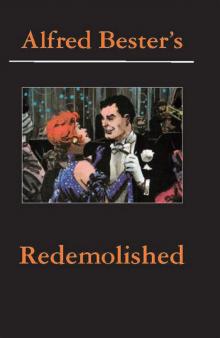 Redemolished
Redemolished The Flowered Thundermug
The Flowered Thundermug The Starcomber
The Starcomber Virtual Unrealities: The Short Fiction of Alfred Bester
Virtual Unrealities: The Short Fiction of Alfred Bester The Computer Connection
The Computer Connection Selected Stories of Alfred Bester
Selected Stories of Alfred Bester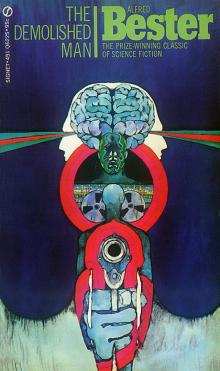 The Demolished Man
The Demolished Man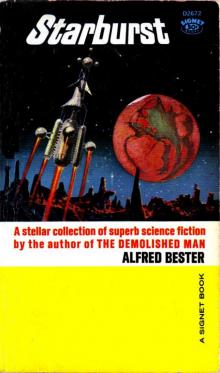 Starburst
Starburst Psychoshop
Psychoshop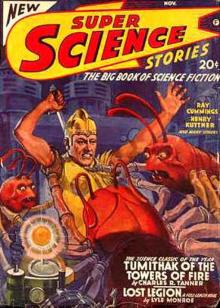 Biped Reegan
Biped Reegan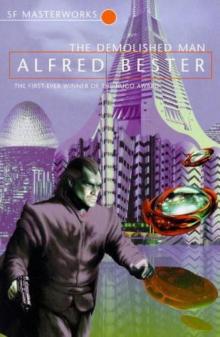 Demolished Man
Demolished Man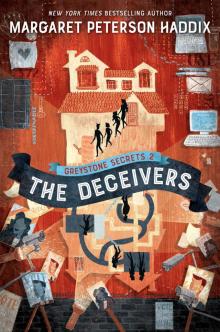 THE DECEIVERS
THE DECEIVERS GOLEM 100
GOLEM 100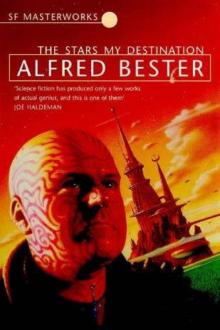 The Stars My Destination
The Stars My Destination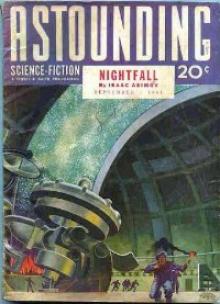 Adam And No Eve
Adam And No Eve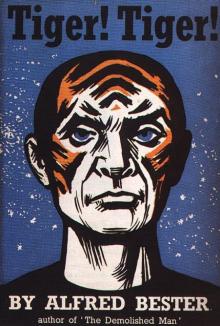 The Stars My Destination ( Tiger! Tiger! )
The Stars My Destination ( Tiger! Tiger! )